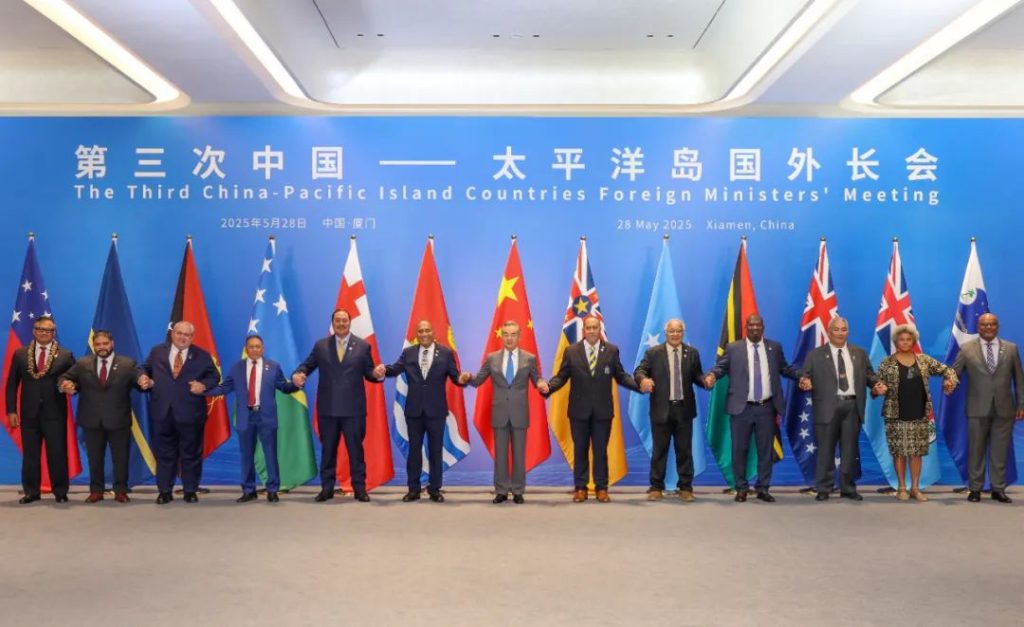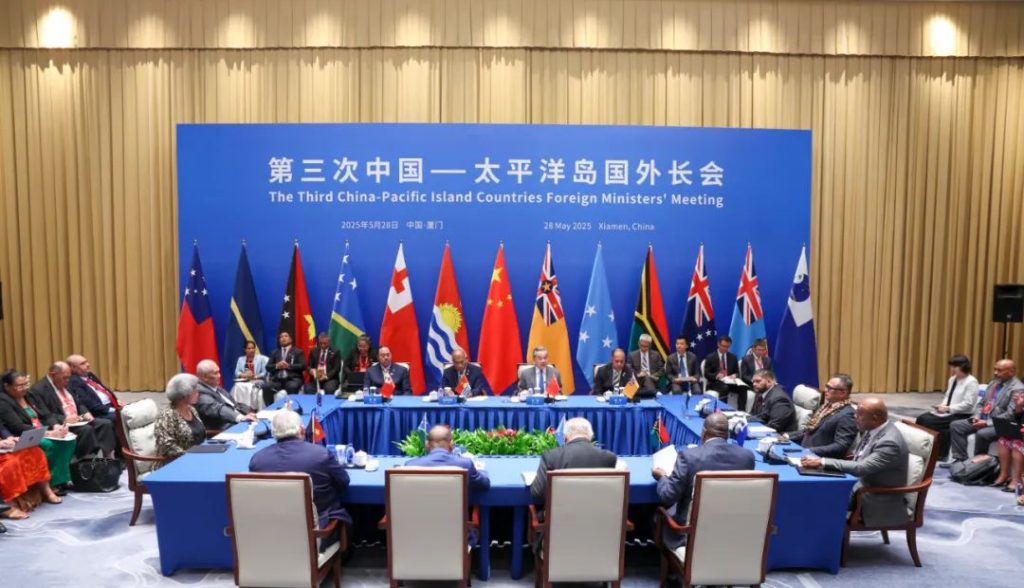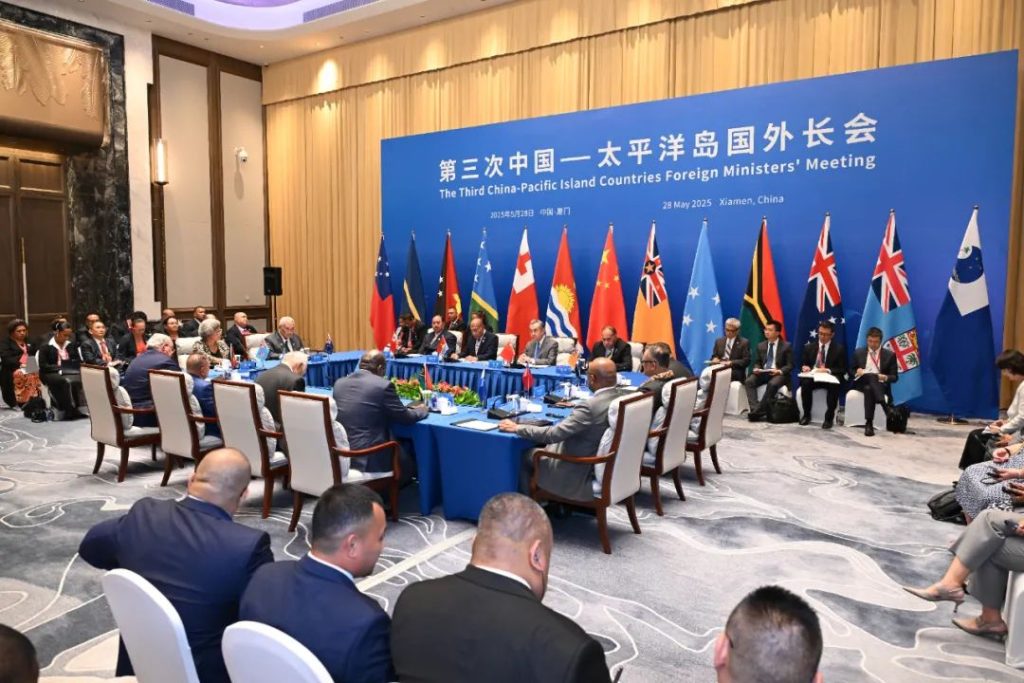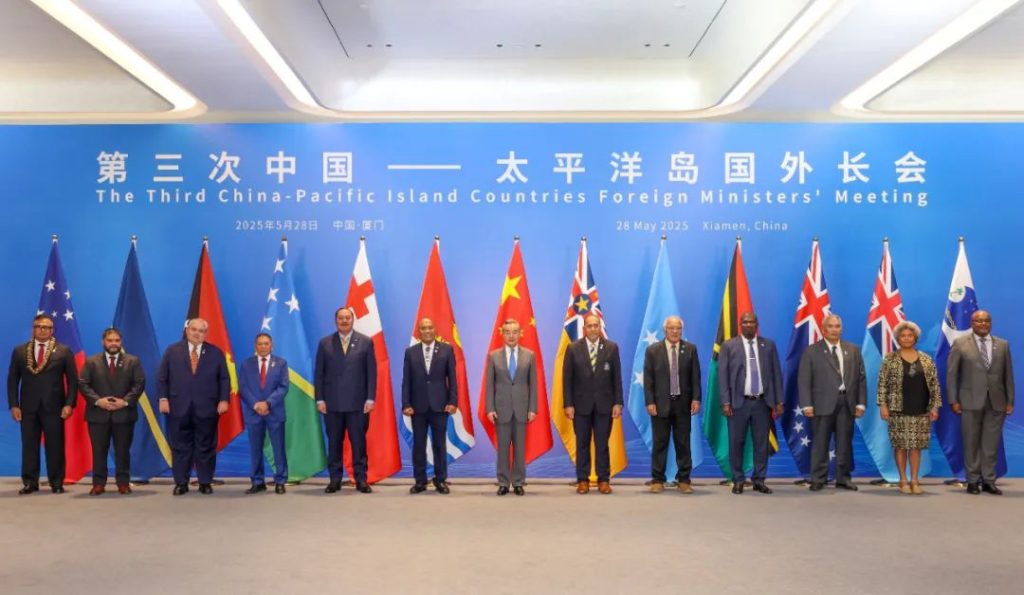On May 28, 2025, Member of the Political Bureau of the CPC Central Committee and Foreign Minister Wang Yi co-chaired the Third China–Pacific Island Countries Foreign Ministers’ Meeting in Xiamen with Kiribati President and Foreign Minister Taneti Maamau.
Participants included Prime Minister and Foreign Minister of Niue Dalton Tagelagi, Crown Prince and Foreign Minister of Tonga Tupouto‘a, Foreign Minister of the Federated States of Micronesia Lorin Robert, Foreign Minister of Solomon Islands Jeremiah Manele, Foreign Minister of Vanuatu Matai Seremaiah, Foreign Minister of Papua New Guinea Justin Tkatchenko, Foreign Minister of the Cook Islands Tingika Elikana, Former President and current Deputy Foreign Minister of Nauru Baron Waqa, Assistant Minister for Foreign Affairs and Deputy Speaker of Parliament of Fiji Lenora Qereqeretabua, Government Representative of Samoa Peseta Vaifou Tevaga, and Deputy Secretary General of the Pacific Islands Forum Esala Nayasi.

Wang Yi remarked that this year marks the 50th anniversary of China establishing diplomatic relations with Pacific Island countries. The bond of friendship between the two sides has withstood the test of time and geographical distance. Regardless of how the international landscape changes, China always regards Pacific Island countries as good friends, good partners, and good brothers.
The development of China–Pacific Island relations vividly demonstrates that “friendship is not about who comes first, and cooperation is not determined by size.” President Xi Jinping’s concept of “four fully respects” serves as the fundamental guideline for China’s relations with these countries. Under the strategic guidance of President Xi and leaders of Pacific Island countries, the comprehensive strategic partnership between China and Pacific Island countries has gained new vitality, achieved fresh results, and reached a new level.
Wang emphasized that the cooperation between China and the Pacific Island countries aligns with the trend of history, responds to the call of the times, and has yielded fruitful results that benefit the people of the islands. It has not only contributed to mutual development but also promoted peace, stability, and prosperity in the region. It sets an example of peaceful coexistence between countries of different sizes and showcases the Global South’s solidarity and pursuit of development.

Wang Yi put forward six proposals for building a China–Pacific Island Countries community with a shared future:
First, uphold mutual respect. China will firmly defend the principle of non-interference in internal affairs and staunchly support Pacific Island countries in safeguarding their sovereignty, security, and development interests. The Taiwan issue is China’s internal affair. Taiwan’s return to China is a part of the victory of the Second World War and a component of the post-war international order. The historical and legal facts are undeniable, and the authority of UN General Assembly Resolution 2758 cannot be challenged. China trusts that Pacific Island countries will continue to adhere to the one-China principle and support China’s just position.
Second, prioritize development. China is ready to work with Pacific Island countries to implement the Global Development Initiative and promote high-quality Belt and Road cooperation. Efforts will be made to accelerate bilateral free trade agreement negotiations, enhance cooperation in agricultural and fisheries technology demonstrations and training, and expand tourism cooperation. China also supports building the law enforcement capacity of island nations.
Third, uphold a people-centered approach. China is willing to deepen exchanges in areas such as poverty alleviation, grassroots governance, and more. Within this year, China will implement 200 “small yet impactful” livelihood projects and send seven batches of 56 medical personnel, including more traditional Chinese medicine doctors, to contribute further to the well-being of people in the island countries.
Fourth, promote mutual learning. China and Pacific Island countries should enhance people-to-people exchanges in media, youth, women, and sports, engaging with each other like family members. China is also willing to work together in joint archaeological research on the Austronesian languages, expand cooperation in cultural heritage preservation, explore the establishment of a think-tank dialogue mechanism, and support sustainable development in the islands.
Fifth, uphold fairness and justice. This year marks the 80th anniversary of the victory in the World Anti-Fascist War and the founding of the United Nations. People around the world aspire to a more civilized, prosperous, and progressive era. China stands ready to work with Pacific Island countries to uphold the international system with the UN at its core and the international order based on international law.
Sixth, advocate solidarity and mutual assistance. China seeks to enhance coordination and cooperation with island countries on global climate governance, promote full and effective implementation of the Paris Agreement, uphold the principle of common but differentiated responsibilities and respective capabilities, and urge developed countries to provide funding, technology, and capacity-building support to developing countries. China will continue to assist island countries in strengthening climate resilience through South-South cooperation.
Wang Yi stressed that the world today is far from peaceful. Hegemonism and power politics are re-emerging, while unilateralism and protectionism are making a comeback. In the face of unprecedented global changes, China firmly believes that peace, development, cooperation, and win-win outcomes are the only correct path forward.
China remains committed to being a builder of world peace, a contributor to global development, and a defender of the international order. China will continue to stand on the side of fairness and justice, the side of history, and the side of the vast number of developing countries, always being a trustworthy and reliable partner for the Global South.
The vastness of the Pacific lies in its inclusiveness; the advancement of human civilization relies on the strength of unity. China is willing to work with all parties to jointly write a new chapter in building a China–Pacific Island Countries community with a shared future.

Representatives from Pacific Island countries spoke highly of President Xi Jinping’s vision of building a community with a shared future for mankind, the “four fully respects” principle, and the three global initiatives. They expressed gratitude for China’s long-term and valuable support for their development and emphasized that friendship with China is highly cherished.
Cooperation with China is based on mutual respect, mutual trust, mutual understanding, and sovereign equality. It is the independent choice of the Pacific Island countries, aligns with their fundamental interests, and helps safeguard regional peace, stability, and prosperity. The representatives reaffirmed their firm commitment to the one-China principle and their support for China in safeguarding national sovereignty and territorial integrity, emphasizing the authority of UN General Assembly Resolution 2758.
They also expressed their willingness to learn from China’s experience in sustainable development, the blue economy, disaster prevention and mitigation, and cultural heritage protection. They are eager to deepen cooperation in infrastructure, climate change, public health, green development, and trade and investment, and to jointly advance high-quality Belt and Road cooperation.
The Pacific Island countries are ready to strengthen solidarity with China, uphold multilateralism, safeguard the basic norms of international relations, and work together to build a peaceful and prosperous Pacific region.
All parties unanimously adopted the Joint Statement of the Third China–Pacific Island Countries Foreign Ministers’ Meeting. China also released a list of measures to implement the outcomes of the meeting, including the China Initiative to Deepen Climate Change Cooperation with Pacific Island Countries.


